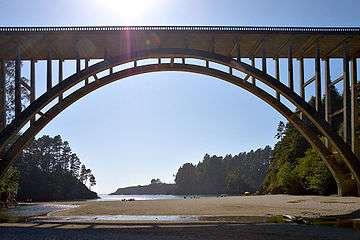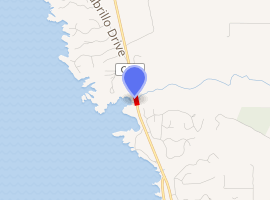Frederick W. Panhorst Bridge
The Frederick W. Panhorst Bridge, more commonly known as the Russian Gulch Bridge, is a reinforced concrete open-spandrel deck arch bridge on California State Highway 1, spanning Russian Gulch Creek in Russian Gulch State Park, Mendocino County, California, United States. It is named after Frederick W. Panhorst, who served as the Chief of the Bridge Section of the California Division of Highways from 1931 to 1960.
Russian Gulch Bridge | |
|---|---|
 The Frederick W. Panhorst Bridge, as seen from the beach in Russian Gulch State Park. | |
| Coordinates | 39°19′45″N 123°48′16.5″W |
| Carries | |
| Crosses | Russian Gulch Creek |
| Locale | Russian Gulch State Park, Mendocino County, California, United States |
| Official name | Frederick W. Panhorst Bridge |
| Maintained by | California Department of Transportation |
| ID number | CA 10-151, BH 11140 |
| Characteristics | |
| Design | open-spandrel deck arch bridge |
| Material | reinforced concrete |
| Total length | 160.6m |
| Longest span | 73.2m |
| No. of spans | 1 |
| History | |
| Designer | Henry E. Kuphal |
| Construction start | 1939 |
| Construction end | 1940 |

| |
Design
The bridge was designed by Henry E. Kuphal. It is similar in design to the more famous Bixby Creek Bridge several hundred miles south on the same highway, but in contrast to the Bixby Creek Bridge, its arch is supported only by the two rocky headlands on either side without need for buttresses.[1] Its main span is 73.2 m (240 ft) long, and its total length is 160.6 m (527 ft);[2] it carries an average of 10,500 vehicles per day.[3]
History
Prior to the bridge's opening, traffic across the gulch was carried on a wooden trestle bridge, built in 1911, that was designed to support the weight of a 6-horse team but was inadequate for later motorized vehicle traffic.[4][5]
The present bridge was constructed at the expense of US$109,000 from 1939 to 1940, and it was dedicated by governor Culbert Olson on June 9, 1940.[4][6] In 1996–1998, the Russian Gulch Bridge and eleven other Mendocino County bridges underwent seismic retrofitting, at a total cost of US$9.7 million.[7][8]
The Russian Gulch Bridge was renamed to be the Frederick W. Panhorst bridge in 1974,[6] by California Senate Concurrent Resolution 145.[9] Panhorst was Chief of the Bridge Section of the California Division of Highways from 1931 to 1960, and served as a director for the American Society of Civil Engineers.[10]
Evaluation
.jpg)
Retired California bridge engineer Arthur Elliott considered the Russian Gulch Bridge to be the most beautiful of California's concrete arch bridges,[11] and it is the frequent subject of photographs.[12] The columns of the bridge are spaced more widely as they become longer, adding to its aesthetics.[1][13] It is eligible for the National Register of Historic Places as the embodiment of a typical mid-20th-century open-spandrel concrete arch bridge, and as an example of the late-career work of Kuphal.[14]
In 2007, Caltrans bridge engineer Barton Newton called the bridge "functionally obsolete" due to its narrow deck, but stated that the bridge was structurally sound.[15][16]
References
- Elliott, Arthur L. (1983), "Esthetic Development of California's Bridges", Journal of Structural Engineering, 109 (9): 2159–2174, doi:10.1061/(ASCE)0733-9445(1983)109:9(2159).
- Russian Gulch Bridge (1939), Structurae.
- Russian Gulch Bridge, Historic Bridges of the U.S.
- "Russian Gulch Bridge on Mendocino Coast Highway Officially Dedicated" (cover story), California Highways and Public Works, December 1940.
- Water and Sewage Works, Volumes 40-41, Scranton Pub. Co., 1911, p. 82.
- Russian Gulch Bridge, California State Park System.
- "Bridges Undergo Quake Upgrades", Santa Rosa Press-Democrat, June 30, 1996.
- Melaragno, Michele G. (1998), Preliminary Design of Bridges for Architects and Engineers, CRC Press, pp. 316–317, ISBN 978-0-8247-0184-0.
- California Highways: Routes 1 through 8.
- 2008 Named Freeways, Highways, Structures and Other Appurtinances in California (PDF), California State Department of Transportation, archived from the original (PDF) on 2012-10-14.
- Journal of the Structural Division, 103, American Society of Civil Engineers, p. 2142.
- Mitchell, Linda; Mitchell, Allen (1992), California Parks Access: A Complete Guide to the State and National Parks for Visitors with Limited Mobility, Cougar Pass Pub. Co., p. 48, ISBN 978-0-9630758-3-3.
- Elliott, Arthur L. (1991), "Creating a beautiful bridge", in National Research Council (ed.), Bridge Aesthetics Around the World, Transportation Research Board, pp. 222, 224, ISBN 978-0-309-05072-2.
- Exhibit 2.17: Cultural Resources Information to Include in Environmental Documents, California State Department of Transportation.
- "Post-war bridges are showing their age", Fort Bragg Advocate, September 20, 2007; Mendocino Beacon, December 5, 2007.
- Deficient major bridges in California, NBC News, August 2, 2007.
| Wikimedia Commons has media related to Frederick W. Panhorst Bridge. |